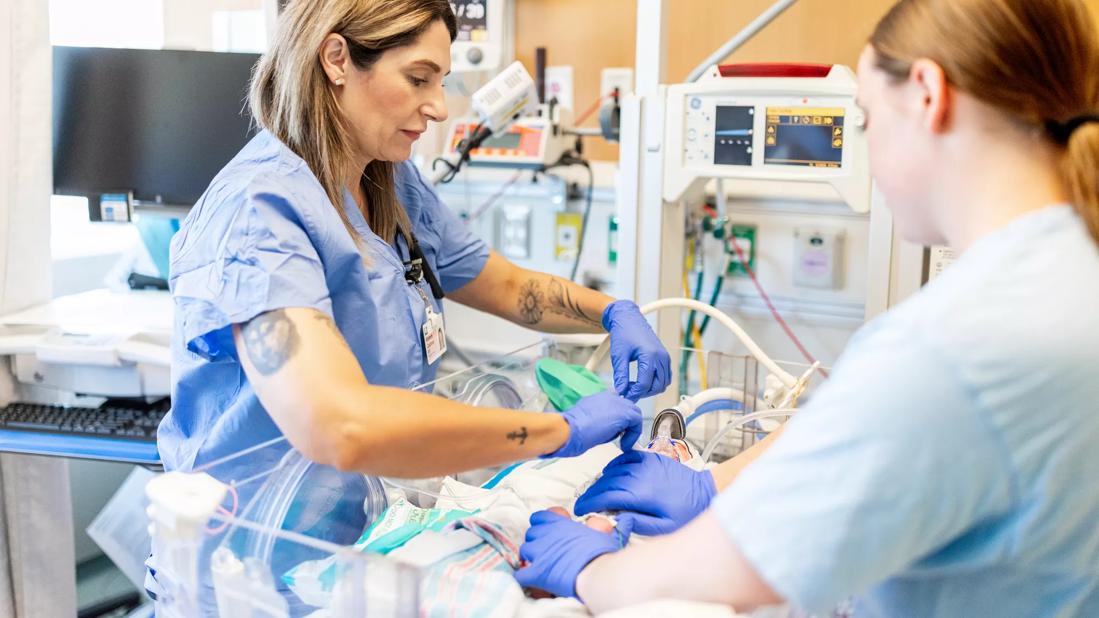Paired with a mentor, interns get hands-on experience

Image content: This image is available to view online.
View image online (https://assets.clevelandclinic.org/transform/2ce9f492-a743-42b8-ace9-21c827fb308d/CHP_4966708_06-14-24_026_LDJ)
Neonatal nurses
Cleveland Clinic’s Nursing Institute relies on numerous succession planning strategies to develop a talent pipeline, identify and grow leaders, and ensure continuity of care. One program, the clinical nurse specialist (CNS) intern program, is aimed at grooming caregivers to fill one of the 25 CNS positions available on the health system’s main campus.
Advertisement
Cleveland Clinic is a non-profit academic medical center. Advertising on our site helps support our mission. We do not endorse non-Cleveland Clinic products or services. Policy
“The overarching goal of the program is to grow our own high-quality clinical nurse specialists,” says Anne Vanderbilt, MSN, APRN, CNP, CNS, senior director of Advanced Practice Nursing. “We take high-performing RNs from various roles and provide them with mentoring and a vigorous orientation process while they are attending a CNS program.”
The number of interns in the program varies, depending on organizational needs. There are currently two CNS interns at Cleveland Clinic.
The internship is a role-transition experience that pairs interested nurses enrolled in a CNS program with a mentor in a designated clinical care area for one to two years. Interns develop skills that allow them to smoothly transition to a licensed CNS role upon successful completion of their educational and nursing board requirements.
Mentors meet with interns routinely to develop goals, assess progress and identify practice opportunities. They help interns understand how to implement CNS competencies into everyday practice, navigate challenges and build professional relationships. Throughout the program, interns gain exposure to each of the three CNS spheres of impact: direct patient care, nurses and nursing practice, and healthcare systems and organization.
Interns work full time while attending school. They perform many of the same tasks as a CNS except for those that require advanced practice certification, such as prescribing medicine. Interns round on patients, assist clinical nurses at the bedside with complex cases, provide unit-specific in-service education and more.
Advertisement
“The intern program allowed me to apply concepts I learned in school to real-life practice,” explains Kayla Little, MSN, APRN, AGCNS-BC, PCCN. “Exposure to clinical scenarios and key stakeholders early on helped me develop relationships and build credibility prior to becoming a credentialed CNS.”
As a CNS, Little now supports cardiovascular medicine, heart and lung transplant, and vascular surgery stepdown units at Cleveland Clinic. She also serves as a mentor to a current CNS intern, Monica Cummins, BSN, RN, PCCN.
Cummins was an assistant nurse manager on a cardiovascular surgery stepdown unit when she enrolled in a Master of Science Nursing program at a local university in 2020. With encouragement from Little, she applied for and was accepted into the CNS intern program. Cummins began working as an intern on six cardiovascular and thoracic surgery stepdown units in January 2021.
With support from Little, Cummins has taken on stretch assignments in all three CNS spheres of impact:
Advertisement
“The day-to-day support I’ve received in the program has helped me feel prepared for the future of my career as a CNS,” says Cummins, who will graduate from the adult-gerontology CNS program at Kent State University in May 2023.
The program not only helps interns; it also benefits the healthcare system.
“The CNS intern program helps to ensure we don’t have gaps in care in clinical areas, which could arise if we waited for nurses to graduate to fill roles,” says Myra King, DNP, APRN, ACNS-BC, CCRN-CSC, who oversees the program as APRN manager.
Based on the positive effect of the program on their careers, Little and one of her peers published an article in 2020 in Clinical Nurse Specialist: The Journal for Advanced Nursing Practice advocating for similar programs at other health systems.
For those interested in adopting a CNS intern program, Vanderbilt and King offer the following advice:
“It is an advanced practice nurse role that is often misunderstood. We have both clinical and organizational expertise,” says Vanderbilt. “With our focus on high reliability and quality, there’s a call for clinical nurse specialists.”
Advertisement
Nearly 14 years after completing her CNS internship, King acknowledges its influence on her career.
“By the time I graduated, I felt I was so far ahead of other students. Not only was I getting mentored by an experienced clinical nurse specialist, but I was actually doing the work alongside a partner who could help me learn,” she says.
Advertisement
Advertisement
Regional organizations collaborate to address nurse faculty shortage
How wellness habits help nurses flourish
Planning continues with critical, patient-focused input from nursing teams
Strengthening care through targeted resources and frontline voices
Embracing generational differences to create strong nursing teams
CRNA careers offer challenge and reward
An unexpected health scare provides a potent reminder of what patients need most from their caregivers
Cleveland Clinic Abu Dhabi initiative reduces ICU admissions and strengthens caregiver collaboration